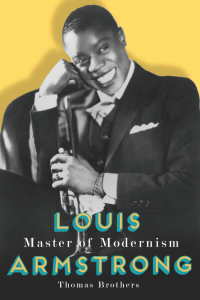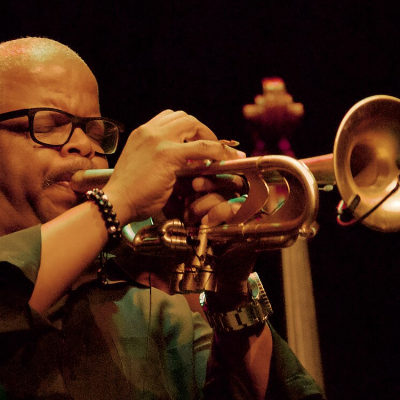In “Louis Armstrong: Master of Modernism, author Thomas Brothers writes about Armstrong’s early fascination with marijuana — an interest that began in Chicago, 1928, while playing the Savoy Ballroom. This interest led to a marijuana possession arrest on November 13, 1930 in the parking lot of Los Angeles’ Cotton Club. “Armstrong was allowed to finish out his night work before they hauled him off to jail around 3:00 A.M.,” Brothers writes.
The following book excerpt begins with a rather humorous transcript from his trial, and then offers a brief reminder of how Armstrong viewed marijuana use.
_________
Transcripts from the March 1931 trial have recently been uncovered and they include advice from the judge: “If you have a nice home and a good wife, and you are getting along all right, don’t be cultivating evil habits….Some people mix marijuana with bootleg whiskey and they go around here with the most exorbitant ideas, and would walk up to this building here, at the corner of it, and try to lift the whole building with one hand,” the judge warned. “You leave marijuana alone.” He was sentenced to thirty days in jail, of which he served nine. In jail he buddied up with two of the inmates and stayed in touch with them for the rest of his life. When he walked through the cell blocks to leave, some of the prisoners asked him to sing. He retrieved his suit, which had been torn apart at the linings in a search for drugs, packed up, and immediately moved to Chicago.
As the decades passed and Armstrong continued smoking pot, the steady hassling and the increasing severity of punishment enraged him. He compared pot laws with the casualness in the United States twoard racial violence. “Why I’d much rather shoot a nigger in his ass than to be caught with a stick of shit,” he wrote. “The Judge would honestly respect you better.” On file in the Library of Congress is a questionnaire about narcotic use by jazz musicians, complete with Armstrong’s handwritten, indignant responses, such as, “The music that comes of a man’s horn is good enough for me — his personal habit, I don’t care.” “Telling kids that gage is the same as heroin and morphine is wrong,” he told interviewer Bill Russell in 1953.
He thought of marijuana as similar to the peppergrass and dandelions his mother used to collect around the railroad tracks for him and his sister to consume as a laxative. That was her recipe for good health, and he stayed true to “physics” for his entire life. “Where other cats make their main ambition money or fame, I’ve made mine health,” he insisted, and the main tools available to him were physics and pot. Marijuana purges the stresses of his mind just as laxatives purged the germs that accumulated in his bowels. “It relaxes you, makes you forget all the bad things that happen to a Negro,” he explained.
Marijuana was “a thousand times better than whiskey,” and he surely said that with the authority of someone who had seen the damage alcohol could inflict. “As a youngster, I witnessed a lot of the old time musicians who were fading out of the scenes, had turned to drinking on and off their jobs, trying to prove to themselves that they were still as good as they once were,” he wrote. Fred Keppard (“slipped out of the scene…a heavy drinker”), Carroll Dickerson (“whisky killed him, babe), Jack Teagarden (“a sad case”), Bix Beiderbecke, Dave Tough, George Wettling, Eddie Condon, Tommy Ladnier — the list is long and tragic. Marijuana was clearly safer. “Bottle babies,” as Mezzrow called them, were inclined to brawling and loutish behavior; gage kept things “mellow and mild.” Armstrong found drinkers sloppy and dirty, pot smokers neat and clean and full of better thoughts. He did not shun alcohol completely, as Oliver did (“will power personified,” as he put it), but his preferences were clear.
The legal status of marijuana was unstable, even more than liquor, with varied laws from state to state. “The law [i.e., police] didn’t give a damn” about pot smoking, insisted pianist Jess Stacey. Budd Johnson, who played saxophone with Armstrong beginning in 1933, said that musicians smoked pot from the bandstand and were not harassed but rather protected by police. Cartoonist E. Simms Campbell’s beguiling 1932 Night-Club Map of Harlem, designed to lure white slummers to the cabaret scene, noted the open sale of marijuana. The move Murder at the Vanities from 1934 featured a song called Sweet Marijuana, sung by the tragic lead and accompanied by smiling Mexican musicians strumming guitars and wearing sombreros. “Sooth me with your caress, sweet marijuana,” Gertrude Michael sang.
Armstrong wasn’t the only one who thought marijuana was a thousand times better than whiskey. During this period “viper clubs” were forming around the country. Armstrong defined viper as “anybody from all walks of live that smoked and respected gage.” “When you’re with another tea smoker it makes you feel a special kinship,” he explained, and he seems to have had plenty of friends. Vipers were waiting for him on his tours. At a gig in St. Louis, in 1933 or so, the musicians were surprised to discover joints on their music stands. Six identically dressed men gently walked up to Armstrong, who greeted them warmly. “We want to present you with this,” they said and handed him a giant joint, one foot long, inscribed “To the king of the vipers, from the vipers club of St. Louis, Missouri.” As the decade wore on, he and Billie Holiday became the reigning monarchs of a loosely knit, national society of vipers, affectionately known as Queen Billie and King Louis.
*

Excerpted from Louis Armstrong: Master of Modernism, by Thomas Brothers
“Sweet Marijuana,” from Murder of the Vanities



































I am a retired trumpet player, met Louis Armstrong twice in 1950’s…,wonderful man, my inspiration. He was a genius, loved pot, smoked it daily, played like a god. In moderation it enhances creativity, listening, personality. More pot, less booze. Fred James
I am a retired trumpet player, met Louis Armstrong twice in 1950’s…,wonderful man, my inspiration. He was a genius, loved pot, smoked it daily, played like a god. In moderation it enhances creativity, listening, personality. More pot, less booze. Fred James
Appreciate your observations, Fred, and the article. Pops is tops.